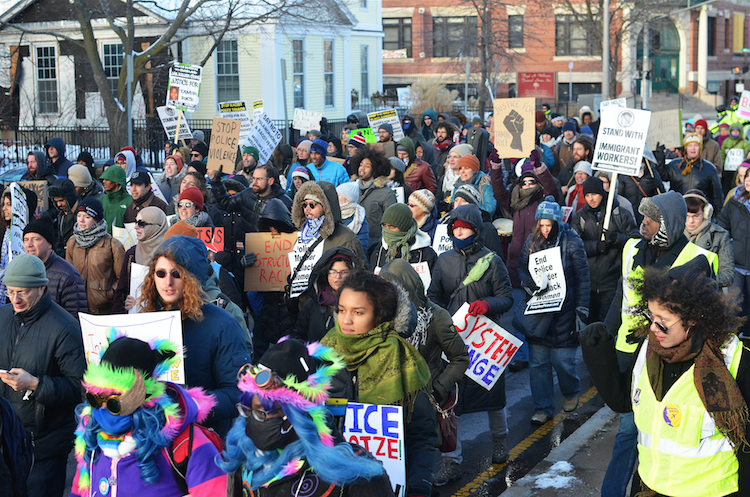By Anna Sorokina, inside editor
With signs that read “Black Liberation Frees Us All” and “Destination Justice,” hundreds of activists marched nearly four miles on Martin Luther King, Jr. Day in temperatures dipping below 20 degrees. Protesters gathered at Joe Moakley Park in Dorchester and made their way to Grove Hall in Roxbury for the modern-day “March for Justice.”
“I’m glad you’re here celebrating MLK Day the right way,” Toussaint Liberator, a Boston-based musician, said to the crowd as they marched through the street.
The march was organized by Mass Action Against Police Brutality and the Fight for $15 Massachusetts, a wage advocacy campaign. Organizers made several demands, including the jailing of police officers who commit acts of violence, a $15 minimum wage and union representation for workers, as well as an end to Islamophobia and institutional racism.
“I challenge all authorities to come out here and work on our wages,” Carla Sheffield, whose son Burrell Ramsey was killed by a police officer in 2012, said. “I know not all cops are killers, but the ones who are should be held accountable.”
As stated on the event’s official Facebook page, “It is undeniable that Dr. King… would have stood with the fast food workers and others fighting for a $15 minimum wage and a union, like he stood with the sanitation workers of Memphis when he was assassinated. He would also have stood against the bigotry and intolerance expressed against followers of Islam.”
Other protesters held signs with photos of Tamir Rice, a 12-year-old boy who was shot and killed by a police officer in Cleveland in November 2014. The officer and his colleague believed Rice had been carrying a handgun in his waistband, though it was later found to be an Airsoft replica that lacked the orange safety feature marking it as an imitation and not a true firearm. Last month, an Ohio grand jury elected not to indict the police officer who shot Rice, a decision widely protested by members of the Black Lives Matter movement and others.
In December, the Washington Post released the results of a yearlong study on police shootings of civilians. The newspaper reported that as of Dec. 24, 965 people had been shot by police officers.
Additionally, although black men make up only 6 percent of the US population, they account for 40 percent of the unarmed men shot to death by police this year, according to the Post’s database.
The crowd chanted as Boston police officers biked alongside them.
“I thought it was a great march – very well-organized, focused on the collective body of issues, folks were present and excited despite the cold weather,” Dave Madan, one of the march participants, said.
To keep march participants warm, Food Not Bombs, an activist anti-war organization, gave out free soup and hot chocolate along different points of the route.
“[The march] brought like-minded people together. And peaceful collaboration between Black Lives Matter and the city police seems like it’s important,” Chris Lamere, volunteer for Food Not Bombs, said. “Police brutality is the most important subject addressed at the March [because] people are dying at the hands of our civil servants.”
Photo by Robert Smith






![A demonstrator hoists a sign above their head that reads, "We [heart] our international students." Among the posters were some listing international scientists, while other protesters held American flags.](https://huntnewsnu.com/wp-content/uploads/2025/06/image12-1200x800.jpg)


